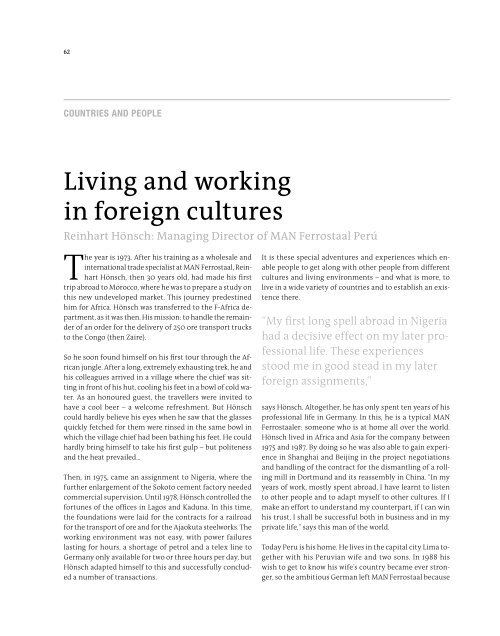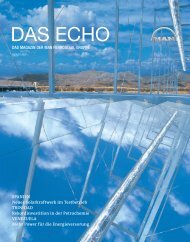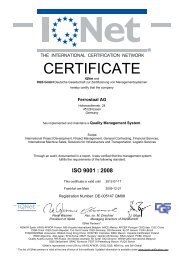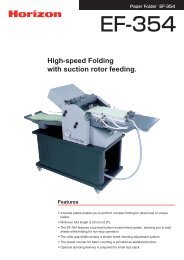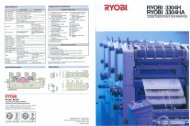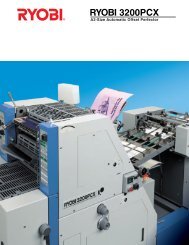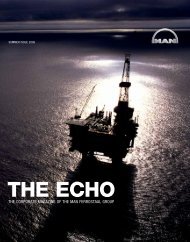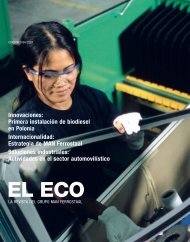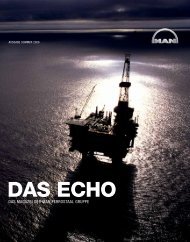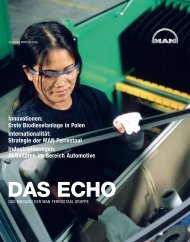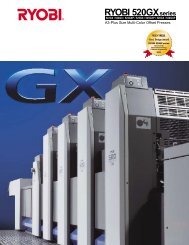THE ECHO - Ferrostaal
THE ECHO - Ferrostaal
THE ECHO - Ferrostaal
You also want an ePaper? Increase the reach of your titles
YUMPU automatically turns print PDFs into web optimized ePapers that Google loves.
62 <strong>THE</strong> <strong>ECHO</strong> August 2007<br />
63<br />
CoUNtriES aNd PEoPlE<br />
Living and working<br />
in foreign cultures<br />
Reinhart Hönsch: Managing Director of MAN <strong>Ferrostaal</strong> Perú<br />
The year is 1973. After his training as a wholesale and<br />
international trade specialist at MAN <strong>Ferrostaal</strong>, Reinhart<br />
Hönsch, then 30 years old, had made his first<br />
trip abroad to Morocco, where he was to prepare a study on<br />
this new undeveloped market. This journey predestined<br />
him for Africa. Hönsch was transferred to the F-Africa department,<br />
as it was then. His mission: to handle the remainder<br />
of an order for the delivery of 250 ore transport trucks<br />
to the Congo (then Zaire).<br />
So he soon found himself on his first tour through the African<br />
jungle. After a long, extremely exhausting trek, he and<br />
his colleagues arrived in a village where the chief was sitting<br />
in front of his hut, cooling his feet in a bowl of cold water.<br />
As an honoured guest, the travellers were invited to<br />
have a cool beer – a welcome refreshment. But Hönsch<br />
could hardly believe his eyes when he saw that the glasses<br />
quickly fetched for them were rinsed in the same bowl in<br />
which the village chief had been bathing his feet. He could<br />
hardly bring himself to take his first gulp – but politeness<br />
and the heat prevailed...<br />
Then, in 1975, came an assignment to Nigeria, where the<br />
further enlargement of the Sokoto cement factory needed<br />
commercial supervision. Until 1978, Hönsch controlled the<br />
fortunes of the offices in Lagos and Kaduna. In this time,<br />
the foundations were laid for the contracts for a railroad<br />
for the transport of ore and for the Ajaokuta steelworks. The<br />
working environment was not easy, with power failures<br />
lasting for hours, a shortage of petrol and a telex line to<br />
Germany only available for two or three hours per day, but<br />
Hönsch adapted himself to this and successfully concluded<br />
a number of transactions.<br />
It is these special adventures and experiences which enable<br />
people to get along with other people from different<br />
cultures and living environments – and what is more, to<br />
live in a wide variety of countries and to establish an existence<br />
there.<br />
“My first long spell abroad in Nigeria<br />
had a decisive effect on my later professional<br />
life. These experiences<br />
stood me in good stead in my later<br />
foreign assignments,”<br />
says Hönsch. Altogether, he has only spent ten years of his<br />
professional life in Germany. In this, he is a typical MAN<br />
<strong>Ferrostaal</strong>er: someone who is at home all over the world.<br />
Hönsch lived in Africa and Asia for the company between<br />
1975 and 1987. By doing so he was also able to gain experience<br />
in Shanghai and Beijing in the project negotiations<br />
and handling of the contract for the dismantling of a rolling<br />
mill in Dortmund and its reassembly in China. “In my<br />
years of work, mostly spent abroad, I have learnt to listen<br />
to other people and to adapt myself to other cultures. If I<br />
make an effort to understand my counterpart, if I can win<br />
his trust, I shall be successful both in business and in my<br />
private life,” says this man of the world.<br />
Today Peru is his home. He lives in the capital city Lima together<br />
with his Peruvian wife and two sons. In 1988 his<br />
wish to get to know his wife’s country became ever stronger,<br />
so the ambitious German left MAN <strong>Ferrostaal</strong> because<br />
Reinhart Hönsch, Managing Director of MAN <strong>Ferrostaal</strong> Perú<br />
at that time the company had no vacancy in his adopted<br />
country. He found a job at a Peruvian and Swiss company<br />
where, as head of department, he built up the machine<br />
business between 1988 and 2001 and gained a thorough<br />
knowledge of the Peruvian market.<br />
This experience led him to return to MAN <strong>Ferrostaal</strong> in<br />
2001, to the company’s oldest South American subsidiary.<br />
He has been Managing Director there since 2005. Mr.<br />
Hönsch sums up the major projects of recent years as follows:<br />
“Above all in the fishing sector we have made an excellent<br />
name for ourselves by supplying MAN diesel engines.<br />
With our former subsidiary MAN Takraf we constructed<br />
and commissioned a copper ore conveyor system<br />
for the largest Peruvian copper mine between 2004 and<br />
2006. We also contributed to developing hydroelectric<br />
power generation by modernising the Callahuanca and El<br />
Platanal power plants. We also play an important role in<br />
the graphics industry – for example we installed complete<br />
lines of MAN Roland at the largest Peruvian newspaper<br />
group, ‘El Comercio’”.<br />
It was with satisfaction that Mr. Hönsch received the news<br />
in February 2007 that MAN AG had decided to confirm<br />
MAN <strong>Ferrostaal</strong> S.A.C. as the first MAN House in South<br />
America. “This is the recognition for the performance of<br />
my staff and for the successful work of my predecessors<br />
who began marketing the products of the MAN Group early<br />
on”.<br />
In view of this much success it is not surprising that the<br />
64-year-old no longer wants to return to Germany. But he<br />
still has close ties to friends and former colleagues and values<br />
many of the accomplishments made by his native<br />
country, for example, the dual training system. He promotes<br />
this form of training in his adopted country Peru in<br />
conjunction with the Peruvian-German Chamber of Commerce<br />
and the Humboldt School Institute, a vocational<br />
school, as well as with German-Peruvian companies for<br />
typical commercial professions. Of course, MAN <strong>Ferrostaal</strong><br />
Perú is also involved: “Each year we have two apprentices<br />
who work in the various departments in the company,”<br />
says Mr. Hönsch.<br />
“One result of our training: every head<br />
of department has a trilingual personal<br />
assistant!”<br />
His unsalaried post as Vice-President of the German Alexander<br />
von Humboldt School is only one of many such posts<br />
for this natural communicator. As a networker, he is also on<br />
the boards of the Lima Chamber of Commerce and of the<br />
Peruvian-German Chamber of Commerce. He gets to know<br />
many of his Peruvian customers here. It is much easier to<br />
discuss ideas about cooperation over a Pisco Sour, the national<br />
drink of Peru, than in a sterile office atmosphere.<br />
When he does this today he is fortunate enough to be able<br />
to sit in an air-conditioned restaurant where the glasses<br />
come sparkling clean from the dishwasher.


